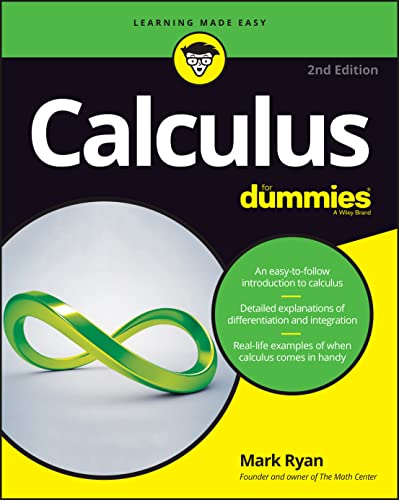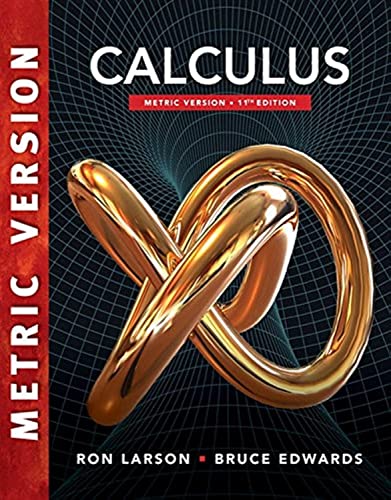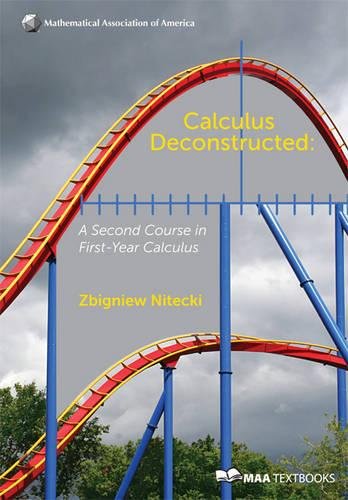Learning Calculus is a scary thought for most students.
Here are the 11 best textbooks in 2024 to learn Calculus.
- Best for High-School: Essential Calculus Skills
- Best for College: Calculus Made Easy
- Best for Self-Study: Calculus: An Intuitive and Physical Approach
- Best Calculus Physics Workbooks (at Algebra & Trig. level): Essential Trig-based Physics Study Guide Workbook
- Best Calculus Physics Workbook (for Uni): Essential Calculus-based Physics Study Guide Workbook
In this workbook, McMullen shares his own strategies for mastering Calculus.
He gives students step-by-step instructions on how to solve problems and lays out the key points for each section. The workbook provides full solutions to every problem presented.
McMullen’s goal with this workbook is not to tackle every possible topic from calculus, but more importantly to focus on the most essential skills. This makes this workbook the perfect choice for someone that’s just starting to learn Calculus.
The author covers the major topics of Calculus in the following order:
- First Derivatives (of Polynomials, Trig Functions, Exponentials, Logarithms),
- Second Derivatives
- Extrema (Maximum and Minimum)
- Limits & L'Hopital's Rule
- Integrals (Indefinite and Definite)
- Integration (Polynomial, Exponential, Logarithmic, Polynomial Substitution, Trigonometric Substitution, and By Parts)
- Multiple Integrals
It’s important to mention that this is a practice workbook, not a book showing the theory behind it.
Note: I’d suggest this book to high-school students, if you’re in college it might be a little too basic. If you're interested in how long it takes to learn high-school Calculus you can read this article.
A revised version of the classic math text, the book contains contemporary language and methods, along with thought-provoking and fun practice problems fit for the modern reader.
It aims to make calculus clear and understandable to undergraduates and learners of all levels.
Thompson explains complicated concepts with great detail, making each point crystal clear. The sidenotes added by Gardner help unlock definitions and expound problems.
Some of the topics included in the book are:
· Sums, Differences, Products, and Quotients
· Successive Differentiation
· Geometrical Meaning of Differentiation
· Maxima and Minima
· Curvature of Curves
· Partial Fractions and Inverse Functions
“Calculus Made Easy” does not only demonstrate how mathematical problems are done and solved. It also shows how the discipline can be used in science and in the real world.
A user-friendly and enjoyable transition book from algebra to calculus, it is definitely worth the read.
The book is a first-rate source of information to augment your Calculus class.
Kline does a great job explaining complex ideas without involving overly complicated examples and algebraic manipulations.
He provides clear-cut explanations supported by illustrative examples to make learning manageable and fun.
You will not lack practice since there are numerous drills provided for you.
There are 25 chapters in the book. Some of the topics covered are:
· In-depth explorations of the derivative
· Theorems on differentiation and antidifferentiation
· Examinations of trigonometric functions
· Techniques of integration
· Polar coordinates
Kline’s historical approach is also perfect in building intuition, letting readers see how mathematics progressed over the years.
Complete and self-contained, you only need high-school math to appreciate “Calculus: An Intuitive and Physical Approach.
A combination study guide and workbook, it covers physics at the level of algebra and trigonometry.
Some of the topics included in this book are vector addition, rotation, projectile motion, collision Newton’s laws, conservation of energy, and more.
You will find fully solved examples of standard physics problems, complete with step-by-step explanations.
Strategies are broken down and illustrated for easy interpretation. There are also charts of symbols containing their meaning and SI units.
The book also provides a definition of terms for essential physics concepts.
All problems included in “Essential Trig-based Physics Study Guide Workbook” can be solved without using a calculator, so it is perfect review material for students taking standardized exams.
With this workbook, you will learn to solve fundamental physics problems and develop fluency in the discipline swiftly and efficiently.
It is meant for students at the university level, focusing on solving fundamental problems in physics with calculus.
Some of the topics discussed in the workbook are calculus-based motion, uniform acceleration, center of mass integrals, moment of inertia integrals, the scalar and vector product, and more.
You will learn how to solve standard physics problems with the many practice exercises provided. McMullen provides a step-by-step discussion for each, so you will know exactly how you arrived at the correct answer.
At the back of the book, there is a section for hints and intermediate answers, along with detailed explanations on solving problems slowly but surely.
Studying physics terms and concepts is easy as most of them are already defined and explained in the book. Meanwhile, symbols with their description and SI units are plotted in charts.
If you want a reliable combination of Calculus-Physics workbook for university, this one is for you.
Far from your typical calculus workbook, it contains over 1,000 fully-solved problems explained step by step.
There are annotations sprinkled throughout the book, clarifying what is being asked. Kelly simplifies concepts and solutions by providing explanatory notes in the margin, adding missing steps if necessary, so you will understand each question correctly.
He also provides pointers to other calculus problems, citing specific skills you need to accomplish each one.
This book includes problems relating to limits, acceleration, derivatives, velocity, continuity, tangent lines, and integrals and some tough topics such as formal Riemann sums and epsilon-delta proofs.
With how Kelly presented solutions, it is not surprising that many readers recommend it for self-study. He even puts a skull icon on specific problems, so you know which are especially challenging.
It must be mentioned that “The Humongous Book of Calculus Problem” does not provide a comprehensive discussion on calculus concepts, so if you are still lacking the basics, this is probably not for you.
The book makes calculus manageable by breaking down differentiation and integration processes into digestible, easy-to-understand concepts.
It will guide you step by step through each operation and solution, expounding on the “hows” and “whys” in plain English and not math-speak.
By eliminating jargon, Ryan makes it easy for anyone to follow his explanations.
Some of the topics covered are:
· What calculus is and why it works
· An algebra and trigonometry review
· The lowdown on limits
· How to use differentiation
· Integration techniques
· Infinite series
· Clever calculus shortcuts
“Calculus For Dummies “ will provide you with accessible tools, allowing you to solve mathematical problems with confidence.
You will also gain a deeper understanding of new concepts and ideas and essential operations and solutions.
With this comprehensive study guide, you will find the motivation to study such an intimidating subject as calculus.
The book offers a comprehensive account of where calculus came from and where it is going next.
Strogatz starts his narrative by citing the discipline’s modest beginnings in ancient Greece, then centuries later when Galileo examined the connection between the pendulum’s length and movement.
The known rivalry between calculus innovators Isaac Newton and Gottfried Wilhelm Leibniz is also mentioned, as well as the great partnerships between astronomers Johannes Kepler and Tycho Brahe.
The book reminds that calculus has real-world applications, from plotting spacecraft course and designing microwave ovens to fighting HIV and other illnesses.
It is not the typical textbook that presents theorems and formulas. Instead, it takes calculus to a different level, making it more exciting and fun for readers.
Strogatz’s discussion is accessible and straightforward. He uses fewer equations and plenty of diagrams.
Informative and interesting, “Infinite Powers: How Calculus Reveals the Secrets of the Universe” is a must-read for students and mathematics instructors.
Integrating print, media, and technology, the book is an efficient aid in learning and teaching.
With its effective pedagogy, the book addresses the needs of varied teaching and learning styles and environments, carefully integrating interesting and challenging content.
This adaptability is why it comes highly recommended, even if it is a bit pricier than other primers.
You will find the exercises in the book relevant and thought-provoking, reinforcing your problem-solving skills and mastery of the subject. They also provide opportunities to apply concepts in real-life situations.
When you use “Calculus (11th Edition)” with the website links, you are provided with tutorials and videos with step-by-step instructions so you will understand concepts and reasoning easier.
There are 15 chapters in the book. Some of the topics covered are:
· Infinite Series
· Conics, Parametric Equations, and Polar Coordinates
· Vectors and the Geometry of Space
· Valued Functions
· Functions of Several Variables
Without a doubt, it deserves to be on your list of must-read calculus books.
The book aims to show that calculus is not just a set of tools and strategies learned by rote. It is where you learn to combine logical reasoning with fundamental concepts and develop mathematical theories.
Spivak provides a wide range of exercises, each reinforced with detailed explanations and illustrations to make learning easy.
He will help you understand why such theorems work and how to apply your new knowledge when you encounter the next calculus problem.
This edition differs from the last one with the inclusion of new practice exercises and updated suggested reading. Like the previous versions, you need basic knowledge in calculus and analysis to appreciate this book.
It provides a solid introduction to complex variable and real numbers fields and unique insights into trigonometric and other transcendental functions.
“Calculus, 4th edition” is an ideal resource for budding mathematicians out there who seek a challenging primer to accurate analysis.
It is appropriate for a beginning Honors Calculus course, assuming you have some exposure to calculus techniques, but not methods of proof, back in high school.
Topics and techniques are single variable calculus, presented with formal definitions and proofs.
For each section, you will find three levels of exercises (including practice, theory, and challenge problems) listed in a rising degree of difficulty.
All materials are covered in this 400-page book, which is about half the size of most first-year calculus texts.
Some of the topics covered are precalculus, sequences and their limits, continuity, differentiation, integration, and power series.
There is no need to use technology such as graphing calculators or symbolic algebra packages.
Intended to motivate and illustrate mathematical precision, “Calculus Deconstructed” is a combination textbook and reference book suited for individual self-study.
This is an excellent book that can help you appreciate calculus in a whole new light.
Sources:











